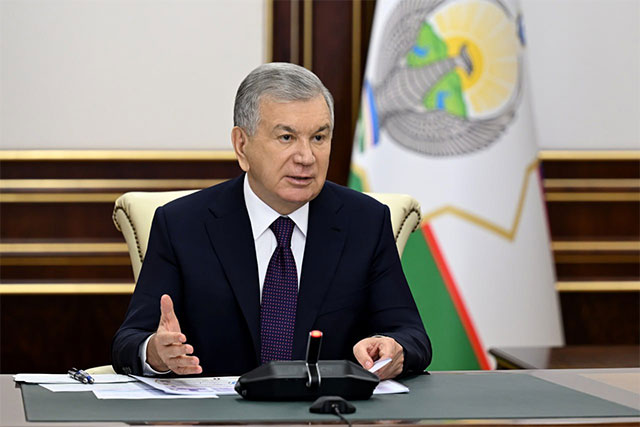
Uzbekistan Approves National Program to Combat Drug-Related Crimes through 2026
Uzbekistan Approves National Program to Combat Drug-Related Crimes through 2026
Tashkent, Uzbekistan (UzDaily.com) — On 3 November 2025, President Shavkat Mirziyoyev reviewed proposals aimed at protecting the nation’s gene pool from drug addiction, enhancing the effectiveness of the fight against cybercrime, and digitalizing the prosecutorial oversight system.
In recent years, drug-related crime has reached a global scale. Analysts report that over 400 million people worldwide suffer from drug dependence, and approximately 300,000 die each year from drug-related causes. Uzbekistan is not immune: more than 11,000 drug crimes have been recorded this year, with roughly 2.5 tons of illegal substances seized. Emerging forms of drug-related offenses, along with expanding geography and scale, necessitate immediate comprehensive action.
At the meeting, officials highlighted negative trends, noting the growing prevalence of psychotropic and synthetic drugs in the form of pharmaceuticals that are convenient to store and distribute, particularly among young people. Synthetic drugs are produced in clandestine laboratories and primarily distributed online under the control of transnational criminal groups. The President emphasized the need to amend national legislation to prevent such threats and ensure uncompromising enforcement.
Authorities presented a comprehensive set of measures to eliminate illegal drug circulation, aimed at protecting public health and safeguarding the nation’s gene pool. Special attention is focused on preventing drug distribution among students, fostering zero tolerance for drug use among youth, tightening criminal liability for offenses targeting young people, and extensive investigative efforts to identify online dealers, organized groups, and clandestine laboratories. The program also includes improving diagnostics, treatment, and rehabilitation for minors and young people suffering from drug dependence.
Following the presentation, the President approved the draft National Program of Comprehensive Practical Measures for the Prevention and Fight against Drug-Related Crimes for 2025–2026. The program encompasses more than 100 operational, preventive, organizational, educational, and information-driven initiatives, with instructions given for continuous implementation.
The meeting also addressed measures to combat cybercrime. Today, over 31 million Uzbek citizens use the internet. Over the past five years, cybercrime has increased 68-fold, with more than 46,000 violations reported this year alone, causing financial losses exceeding 1.2 trillion soums. Incidents of personal data fraud, bank card misuse, and electronic signature abuses have risen. Shortcomings include insufficient protection of personal data, weak cybersecurity in biometric identification and e-signature usage, and low effectiveness in preventing cyberattacks and detecting suspicious financial operations.
The President supported proposals to strengthen the legal, technological, and methodological framework, enforce mandatory cybersecurity requirements for handling personal data, create a registry of operators, and tighten liability for unlawful use. Measures include implementing advanced protection systems for online microloans, round-the-clock blocking of suspicious bank accounts, releasing citizens from obligations on fraudulently issued microloans, and conducting research on new forms of cybercrime, including attacks on smart devices and illicit acquisition of crypto assets. He instructed the Cybersecurity Center of the Ministry of Internal Affairs to enhance its capabilities, strengthen the fight against cybercrime, and introduce seven new types of expertise for the rapid detection of digital offenses.
Special attention was given to the digitalization of government bodies and agencies, aimed at reducing bureaucracy and corruption, increasing transparency and openness, and improving access to public services for citizens and businesses. In 2025, digitalization of procurement processes saved 7.5 trillion soums, while citizens can access nearly 1,000 types of public services remotely. Simultaneously, over 7,000 illegal documents were identified, and oversight bodies violated the rights of 12,500 entrepreneurs, prompting the creation of a system for remote monitoring of law enforcement and full digitalization of inspections.
Within this framework, the President reviewed proposals to implement digital prosecutorial oversight in the General Prosecutor’s Office, automating inspection and monitoring processes to detect legal violations in real time, control officials’ actions, and ensure transparency. It was noted that the absence of a unified system for evaluating investigators’ performance and manual reporting reduces efficiency: report preparation takes up to a week, and most criminal case files are kept on paper. Since the beginning of the year, investigators committed procedural violations in 1,300 cases, and 637 cases were returned to courts for further investigation.
The President instructed the full digitalization of the process—from the receipt of crime reports to the execution of court decisions—and the adoption of artificial intelligence technologies in investigative work, alongside training specialists in AI, cyber, and digital law. The goal is to develop a professional cadre capable of using modern analytical methods, anticipating digital risks, and responding effectively to threats. Following the meeting, specific instructions were issued to responsible officials for the implementation of all assigned tasks.
#Shavkat Mirziyoyev